If your car does not have the right amount of antifreeze, its engine can overheat during summer or freeze during winter. This lack of antifreeze might be due to a leak. This article will discuss car leaking antifreeze when parked – causes and how to fix it.
Even if your car is parked, its engine coolant can still leak. One of the most common causes of leaking antifreeze is damaged components in your car’s cooling system. There might be a torn hose, bad radiator cap, damaged head gasket or water pump, or even a damaged radiator.
When you switch off the ignition, fluid leaks from a damaged heater core because the coolant tends to sit in it when the heating is turned off, the fluid only pumps back out into the primary cooling system if you turn on the engine and you switch on the heating again.
Read on to learn more about the leaking antifreeze when your car is parked, its causes, and fixes.
Car Leaking Antifreeze When Parked
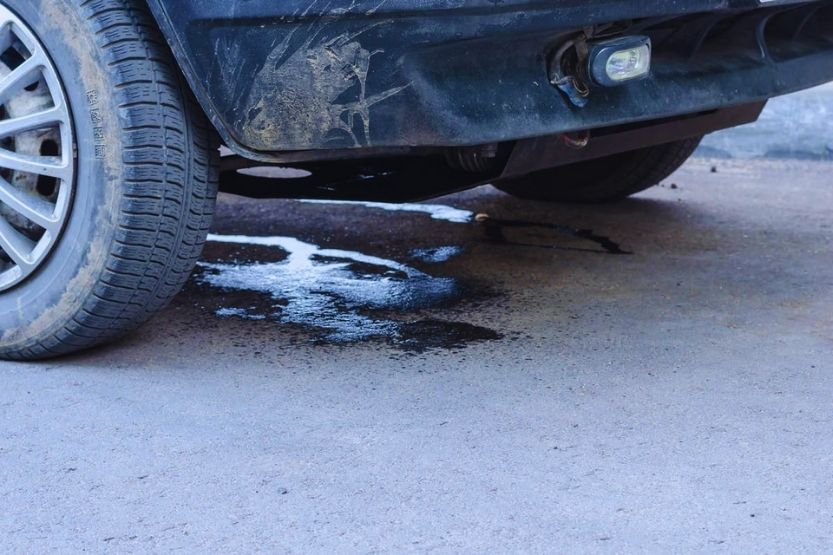
Bad Component in the Car’s Cooling System
If your car was leaking antifreeze when you parked it, it could be that there is a bad component in the car’s cooling system. Perhaps the radiator has gone bad, or it could be a damaged head gasket or broken water pump. It could also be a simple torn hose or a faulty radiator cap.
Leak from Damaged Heated Core
The antifreeze tends to leak from a damaged heated core when turning the engine off. When you turn the heater off, the coolant tends to sit in the heater core and will only be pumped back out into the primary cooling system when you turn on the ignition and the heater on.
Trace the Source of the Leak
There is a way you can determine where the leak is coming from. You need to look for puddles of liquid underneath your car. If you see any collection of liquid dripping somewhere, it could have flowed out from any part of the cooling system. You need to trace the flow of that liquid to find the source of the leak.
Possible Causes of Antifreeze Leak
As I have already mentioned, your car’s cooling system consists of several components. So, if there is an antifreeze leak, it could be due to a problem in one of these components. Here are some of the most common reasons for this problem:
1. Broken Heater Core
When the heater core pumps the hot coolant to the engine, the heat produced is blown into the car through the ventilation system. This is what happens each time you turn on your car’s heater.
However, if this heater core is malfunctioning, most likely, the coolant will leak underneath the passenger seat of your car.
2. Hole in the Radiator
Every time you run the engine, it produces and receives too much heat. This is why engines are built strong to withstand extreme temperatures while running. As you use your car, you can’t prevent corrosion in some engine parts because of the water in its cooling system.
Antifreeze leaking will occur in metal parts of the engine’s cooling system that has already corroded due to long use and improper maintenance. For instance, corrosion in the radiator will cause the formation of holes. This is the leading cause of antifreeze leaks.
As the radiator gets old, its tubes grow weaker. Sediments settle inside these tubes, which causes the formation of holes, which in turn causes leaks.
3. Bad Hoses
Several hoses connect the radiator to the cooling system of the engine. As these hoses get older, they become hard and brittle. They can develop cracks. So, it would not provide a perfect seal to the system. The hoses connected to the water pump, the radiator, and the heater core will be the possible spots where car leaking antifreeze could occur.
4. Bad Sealing Gasket
There is a sealing gasket between the radiator and the coolant tank. As it gets older, this gasket will wear out. When this happens, antifreeze leaking will occur.
5. Leaking Radiator Cap
The radiator’s cap is small, but it performs an important job. Inside the radiator is extreme water pressure. The part of the cooling system that keeps a tight seal on this tremendous pressure is the radiator cap.
It helps maintain the correct pressure so the cooling system will function properly. However, over time, the radiator cap seal will deteriorate. When its spring gets old, it will allow the coolant to escape, and you will experience antifreeze leaking.
6. Bad Water Pump
The pump of the cooling system keeps the coolant circulating throughout the system. A belt drives this pump. This pump is located at the lower part of the engine, close to the drive belts. It is connected to the radiator’s lower hose.
There are times when the connection to this hose gets corroded or becomes loose. It can also sustain external damage due to many reasons. If any of these things happen, antifreeze leaking will occur.
The engine will overheat when the water pump cannot thoroughly circulate the coolant through the entire cooling system.
7. Head Gasket Is Blown
When a head gasket in the engine blows, you will not feel the consequences at once. This head gasket also plays an essential function in the efficient operation of the engine. Its role is to control a wide range of engine temperatures.
This head gasket must also withstand extreme pressure inside the engine, both high and low. It is installed between the engine block and the cylinder head. When a leak develops in this gasket, they say it has blown.
The gasket will no longer separate the coolant and the engine oil when this occurs. This situation is hazardous to the engine. It will allow the antifreeze to leak, which will result in a drop in the coolant level. The cooling system won’t cool the engine, leading to engine failure.
8. Malfunctioning Intake Manifold Gasket
A bad intake manifold gasket can also cause antifreeze leaking. The leak will come from the gasket inside the intake manifold where your car’s engine is connected. You need to have this condition fixed to prevent further damage to the engine.
9. Faulty Expansion Tank
The expansion tank supplies the antifreeze to the radiator. It is the plastic container that is located beside the engine. The radiator is also connected to this tank through a rubber hose. As the engine heats up or cools down, this tank feeds and receives coolant to and from the radiator.
Over time, this expansion tank will wear out and grow weak, followed by other parts connected to it. The plastic tank can crack and develop leaks. If this happens, it will allow the coolant to escape.
An overflowing or malfunctioning coolant tank can also cause antifreeze leaking. When this reservoir is overfilled, a coolant leak happens. This might appear as a coolant leak. So, it’s important that you first check if the tank contains more than its coolant capacity before thinking of replacing it. You need to change it only if you’ve seen that it’s already worn out.
Again, car leaking antifreeze when parked – what causes this issue? If your car is leaking antifreeze even when parked, you should check whether there is a radiator cap leak, external coolant leak, or an internal coolant leak.
How Much Coolant Should Be in the Overflow Tank?
Fixing Antifreeze Leaks When Car Is Parked
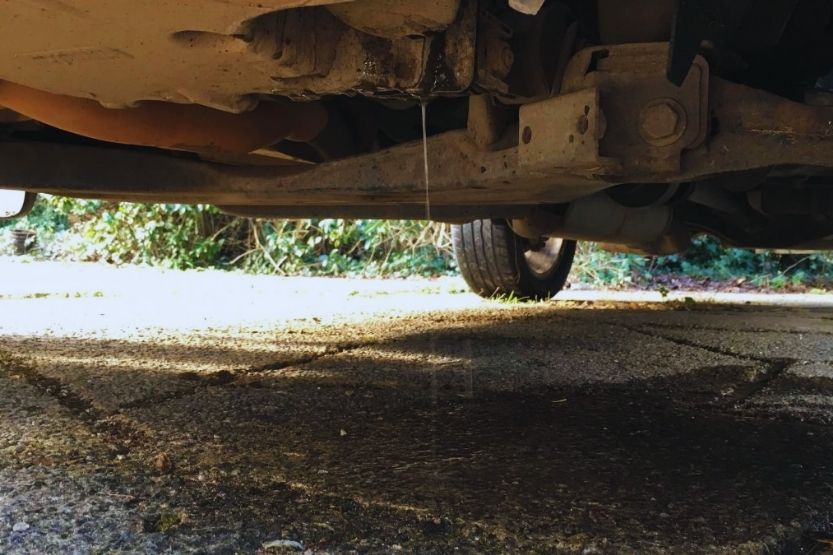
When fixing antifreeze leaking when your car is parked, the first thing you need to do is determine the exact spot of the source of the leak. You can only start fixing the leak once you have isolated the source from the other usual suspects.
Here are the common fixes that you can perform for the specific sources of the leak:
1. Radiator Leak
To fix a leaky radiator, apply a cooling system sealer. If the leak is not that extensive and serious, this fix will stop the leak. But for a severe leak caused by serious radiator damage, you may have to remove the radiator and give it to a radiator specialist for its needed repairs.
2. Cracked or Punctured Coolant Reservoir
Fixing the cracks or punctures of the coolant tank is very easy. Just use a silicone sealer and apply it on and around the damaged part of the reservoir. But if the crack or puncture is huge, you need to replace the whole coolant tank.
In replacing the damaged coolant reservoir, you first need to remove the hoses connecting it to the coolant pressure. Remove the mounting bolts and the electrical connector as well. And then reconnect the electrical connector to the new reservoir and the coolant hoses.
3. Damaged Heater Core
If you have determined that the cause of the leak is a damaged heater core, the best fix for this is to replace it with a new one. If possible, buy the same type of heater core. It should preferably be made of aluminum that has a copper heater core. This type is very durable and is long-lasting.
4. Damaged Water Pump
If the one at fault is a damaged water pump, the only fix to this problem is to replace it. You can buy a new unit or a remanufactured one if you work on a budget. In replacing the water pump, you need to follow these steps:
- Remove the belt drive components of the engine.
- Carefully remove the hose connected to the damaged water pump.
- Unscrew the bolts of the faulty water pump.
- Since you are already checking the leak, go and check the other components of the cooling system for any possible damages.
- Carefully install the new water pump. If needed, apply sealant to the connectors.
- Screw in the bolts and tighten them.
- Connect the hose to the water pump.
5. Bad Hose
If you suspect that small leaks are coming from the hose or hoses, you can either apply rubber cement or use a hose repair tape to cover those small holes or cracks. Or, if there are no holes, you can tighten the hose clamp.
If serious leaks are coming from a hose, you can cut the damaged section. Then remove the bolts on the replacement coupler and attach the hose’s cut ends to the clamp mender. Then tighten the bolt until the clamp is tight enough. Continue to tighten the connector until there is no more antifreeze leaking.
Locating the Exact Leak Spot
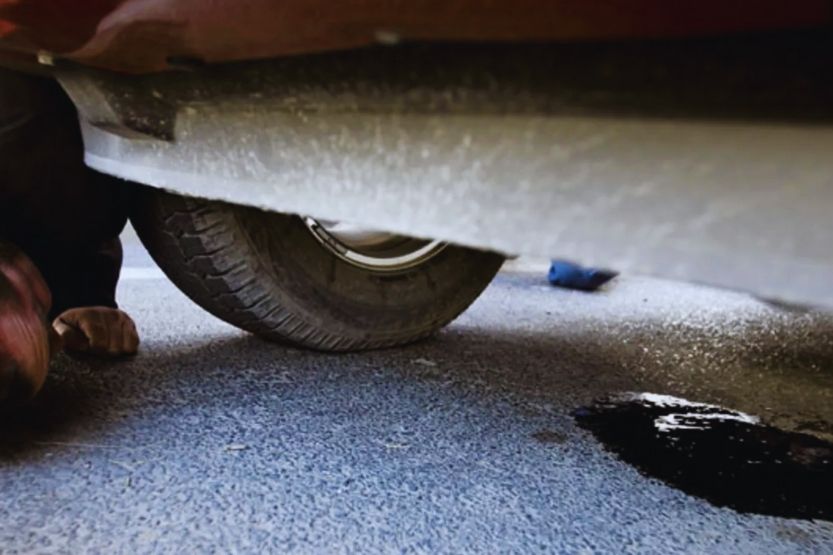
Here are some tips on how you can locate coolant leaks when your car is parked:
- Drive your car first until is it fully warmed up.
- Park in a clean and dry section of the pavement – preferably in your own driveway.
- Turn the engine off, and allow it to cool down.
- Now, look underneath your car and see where a pool of liquid has gathered on the pavement.
- That spot may not be the actual spot where the leak is coming from. Your search is over if it turns out to be the actual source of the leak. But if it’s not, just track the flow of liquid on the hoses of the cooling system. Pretty soon, you will find the source of the leak.
Note that the radiator cap is boiling when the engine is fully warmed up, and the water inside has tremendous pressure. Do not remove the lid until the engine has thoroughly cooled down.
Conclusion: Car Leaking Antifreeze When Parked
If your car’s antifreeze is leaking, there must be a problem with its cooling system even when it is parked. The engine’s cooling system consists of many parts or components. If only one of its components goes bad, it will spell trouble for the engine.
The antifreeze leaking problem could be caused by a torn hose, damaged head gasket, bad water pump, bad radiator cap, or even a damaged radiator. You need to fix the problem because if you don’t, it will lead to more severe damage to the engine, which can be more expensive to repair.
Related reading:
Oil in Coolant [Causes and Solutions to Coolant in Oil]
Toyota Long Life Coolant and Super Long Life Coolant [Review]

![Transmission Fluid Leak When Parked [12 Causes and How to Fix] transmission fluid leak when parked](https://roadsumo.com/wp-content/uploads/2021/06/transmission-fluid-leak-when-parked-150x150.jpg)
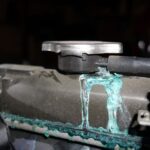

![How to Put Antifreeze in Car [Where Does Antifreeze Go?] how to put antifreeze in car](https://roadsumo.com/wp-content/uploads/2022/01/how-to-put-antifreeze-in-car-150x150.jpg)

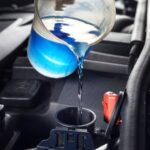

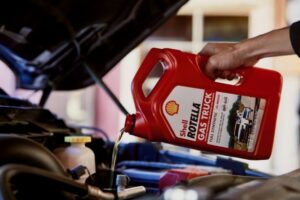
![Read more about the article Honda Brake Fluid [What You Need to Know]](https://roadsumo.com/wp-content/uploads/2022/02/Honda-brake-fluid-300x200.jpg)